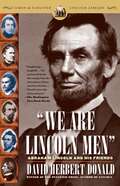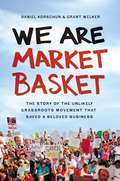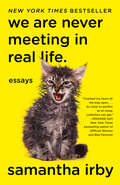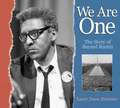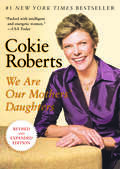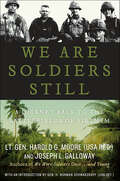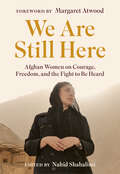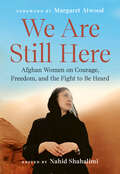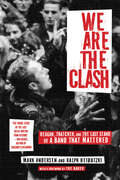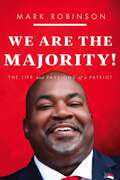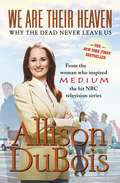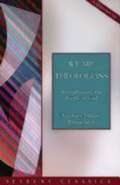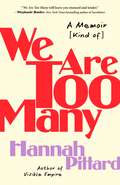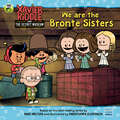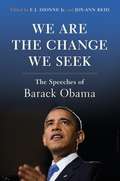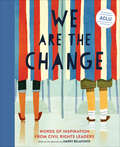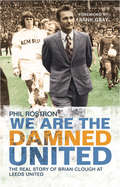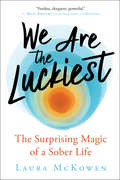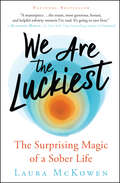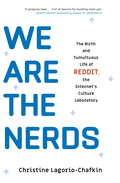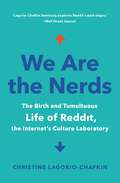- Table View
- List View
We Are Here: 30 Inspiring Asian Americans and Pacific Islanders Who Have Shaped the United States
by Naomi Hirahara Smithsonian InstitutionA stunning anthology licensed in partnership with the Smithsonian Asian Pacific American Center, We Are Here celebrates 30 of the most inspiring Asian Americans and Pacific Islanders in U.S. history. There are more than 23 million people of Asian and Pacific Islander descent living in the United States. Their stories span across generations, as well as across the world. We Are Here highlights thirty Asian Americans and Pacific Islanders and the impact they&’ve had on the cultural, social, and political fabric of the United States.Profiles include: Amanda Nguyen * Bruno Mars * Grace Lee Boggs * Lakshmi Singh * Naomi Osaka * Philip Vera Cruz * Vishavjit Singh * Shirin Neshat * Thenmozhi Soundararajan * Schuyler Miwon Hong Bailar * Channapha Khamvongsa * Lydia XZ Brown * Etel Adnan * Chien-Shiung Wu * Jerry Yang * Carissa Moore * Craig Santos Perez * Dwayne &“The Rock&” Johnson * Eddie Aikau * John Kneubuhl * Kathy Jetñil-Kijiner * Keanu Reeves * Hinaleimoana Kwai Kong Wong-Kalu * Manny Crisostomo * Momi Cazimero * Teresa Teaiwa * Mau Piailug * Taimane Gardner * Calvin and Charlene Hoe * Dinah Jane
We Are Lincoln Men: Abraham Lincoln and His Friends
by David Herbert DonaldIn this brilliant and illuminating portrait of our sixteenth president, two-time Pulitzer Prize-winner David Herbert Donald examines the significance of friendship in Abraham Lincoln's life and the role it played in shaping his career and his presidency.Though Abraham Lincoln had hundreds of acquaintances and dozens of admirers, he had almost no intimate friends. Behind his mask of affability and endless stream of humorous anecdotes, he maintained an inviolate reserve that only a few were ever able to penetrate. Professor Donald's remarkable book offers a fresh way of looking at Abraham Lincoln, both as a man who needed friendship and as a leader who understood the importance of friendship in the management of men. Donald penetrates Lincoln's mysterious reserve to offer a new picture of the president's inner life and to explain his unsurpassed political skills.
We Are Makers: Real Women and Girls Shaping Our World
by Amy RichardsMAKERS is the award-winning video collection of women's stories. And we're bringing these inspirational and amazing stories to young readers in a book!Did you know that Kathrine Switzer, the first woman to complete the Boston marathon in 1967, was almost pulled off the course before she could finish the race? And that Mae Jemison, an astronaut, was inspired by a Star Trek character to pursue her passion in science?Behind every successful woman is the fascinating story of how she got to the top. And throughout history, trailblazing women have opened doors for those who followed. Based on the rich collection of interviews and documentaries from MAKERS, this book introduces pioneering women from all walks of life. Readers will get to know these women's hopes, dreams, challenges, and accomplishments in chapters filled with personal stories, historical information, inspiring quotes, and much more. They will learn about the women's movement and its impact today, and about common experiences women have. Most importantly, they'll be inspired to follow their dreams and become MAKERS themselves!
We Are Market Basket: The Story of the Unlikely Grassroots Movement That Saved a Beloved Business
by Daniel Korschun Grant WelkerWhat if a company were so treasured and trusted that people literally took to the streets—by the thousands—to save it? That company is Market Basket, a popular New England supermarket chain.With its arresting firsthand accounts from the streets and executive suites, We Are Market Basket is as inspiring as it is instructive. What is it about Market Basket and its leader that provokes such ferocious loyalty? How does a company spread across three states maintain a culture that embraces everyone—from cashier to customer—as family? Can a company really become an industry leader by prioritizing stakeholders over shareholders?After long-time CEO Arthur T. Demoulas was ousted by his cousin Arthur S. Demoulas, the company's managers and rank-and-file workers struck back. Risking their own livelihoods to restore the job of their beloved boss they walked out, but they didn't walk far.The national media and experts were stunned by the unprecedented defense of an executive.All openly challenged the Market Basket board of directors to make things right. In the end:They were joined by loyal customers at protest rallies—leaving stores empty.Suppliers and vendors stopped deliveries—rendering shelves bare.Politicians were forced to take sides.Set against a backdrop of bad blood and corporate greed, We Are Market Basket is a page-turner that chronicles the epic rise, fall, and redemption of this iconic and uniquely American company.Note: There are links to media content within the text of this EBook which may not work on all reading devices.
We Are Michael Field
by Emma DonoghueThe story of two eccentric Victorian spinsters, Katherine Bradley and her niece Edith Cooper, poets and lovers, who wrote together under the name Michael Field.
We Are Never Meeting in Real Life.: Essays
by Samantha Irby<p>Sometimes you just have to laugh, even when life is a dumpster fire. <P>With We Are Never Meeting in Real Life., “bitches gotta eat” blogger and comedian Samantha Irby turns the serio-comic essay into an art form. <P>Whether talking about how her difficult childhood has led to a problem in making “adult” budgets, explaining why she should be the new Bachelorette—she's "35-ish, but could easily pass for 60-something"—detailing a disastrous pilgrimage-slash-romantic-vacation to Nashville to scatter her estranged father's ashes, sharing awkward sexual encounters, or dispensing advice on how to navigate friendships with former drinking buddies who are now suburban moms—hang in there for the Costco loot—she’s as deft at poking fun at the ghosts of her past self as she is at capturing powerful emotional truths. <P><b>A New York Times Bestseller</b>
We Are Not Here to Be Bystanders: A Memoir of Love and Resistance
by Linda SarsourLinda Sarsour, co-organizer of the Women’s March, shares an “unforgettable memoir” (Booklist) about how growing up Palestinian Muslim American, feminist, and empowered moved her to become a globally recognized activist on behalf of marginalized communities across the country. <p><p> On a chilly spring morning in Brooklyn, nineteen-year-old Linda Sarsour stared at her reflection, dressed in a hijab for the first time. She saw in the mirror the woman she was growing to be—a young Muslim American woman unapologetic in her faith and her activism, who would discover her innate sense of justice in the aftermath of 9/11. Now heralded for her award-winning leadership of the Women’s March on Washington, Sarsour offers a “moving memoir [that] is a testament to the power of love in action” (Michelle Alexander, author of The New Jim Crow). <p><p> From the Brooklyn bodega her father owned, where Linda learned the real meaning of intersectionality, to protests in the streets of Washington, DC, Linda’s experience as a daughter of Palestinian immigrants is a moving portrayal of what it means to find one’s voice and use it for the good of others. We follow Linda as she learns the tenets of successful community organizing, and through decades of fighting for racial, economic, gender, and social justice, as she becomes one of the most recognized activists in the nation. We also see her honoring her grandmother’s dying wish, protecting her children, building resilient friendships, and mentoring others even as she loses her first mentor in a tragic accident. Throughout, she inspires you to take action as she reaffirms that we are not here to be bystanders.
We Are One: the Story of Bayard Rustin
by Larry Dane BrimnerBayard Rustin's life was dedicated to helping others-fighting injustices and discriminations-so that people could live as one. Protesting segregation long before there was a civil rights movement, he was often arrested for his beliefs and actions. As an organizer, Bayard was largely responsible for bringing people together to walk for freedom and jobs in Washington, D. C., on that memorable summer day, August 28, 1963.
We Are Our Mothers' Daughters: Revised And Expanded Edition
by Cokie RobertsThe “entertaining and evocative” #1 New York Times bestseller, profiling extraordinary women from mother to mechanic and sister to soldier (The Hill).This is a revised and expanded edition of legendary journalist Cokie Roberts’s collection of personal essays and biographical profiles, “a celebration of women in their various roles: mother, sister, civil rights advocate, consumer advocate, first-class mechanic, politician—which Roberts’ own mother once was” (The Washington Post).“A flock of fascinating women.” —Dallas Morning News“Inspirational stories of women who have successfully nurtured their children while working outside the home. With humor, honesty, and optimism, [Roberts] provides perspective on this balancing act.” —Newsday“Her subject matter intrigues for both her personal spin and the biographies of unusual and powerful women.” —Los Angeles Times“Lively reading.” —USA Today
We Are Soldiers Still: A Journey Back to the Battlefields of Vietnam
by Joseph L. Galloway Lt. Gen. Harold G. Moore“Powerful. . . . A candid, highly informative, and heartfelt tale of forgiveness between former fierce enemies in the Vietnam War.” —St. Petersburg TimesThe #1 New York Times bestseller We Were Soldiers Once . . . and Young brought to life one of the most pivotal and heartbreaking battles of the Vietnam War. In this powerful sequel, Lt. Gen Harold G. Moore and Joseph L. Galloway bring us up to date on the cadre of soldiers introduced in their first memoir.Returning to Vietnam’s Ia Drang Valley more than four decades after the battle, Moore and Galloway renew their relationships with ten American veterans of the fabled conflict—and with former adversaries—exploring how the war changed them all, as well as their two countries. We Are Soldiers Still is an emotional journey back to hallowed ground, putting a human face on warfare as the authors reflect on war’s devastating cost. The book includes an Introduction by Gen H. Norman Schwarzkopf.
We Are Still Here: Afghan Women on Courage, Freedom, and the Fight to Be Heard
by Margaret Atwood Nahid ShahalimiA collection of first-hand accounts from courageous Afghan women who refuse to be silenced in the face of the Taliban.After decades of significant progress, the prospects of women and girls in Afghanistan are once again dependent on radical Islamists who reject gender equality. When the United States announced the end of their twenty-year occupation and the Taliban seized control of the country on August 15, 2021, a steep regression of social, political, and economic freedoms for women in the country began. But just because a brutal regime has taken over doesn't mean Afghan women will stand by while their rights are stripped away. In We Are Still Here, artist and activist Nahid Shahalimi compiles the voices of thirteen powerful, insightful, and influential Afghan women who have worked as politicians, journalists, scientists, filmmakers, artists, coders, musicians, and more. As they reflect on their country's past, stories of their own upbringing and the ways they have been able to empower girls and women over the past two decades emerge. They report on the fear and pain caused by the impending loss of their homeland, but, above all, on what many girls and women in Afghanistan have already lost: freedom, self-determination, and joy. The result is an arresting book that issues an appeal to remember Afghan girls and women and to show solidarity with them. Like us, they have a right to freedom and dignity, and together we must fight for their place in the free world because Afghanistan is only geographically distant. Extremist ideas know no limits.
We Are Still Here: Afghan Women on Courage, Freedom, and the Fight to Be Heard
by Margaret Atwood Nahid ShahalimiA collection of first-hand accounts from courageous Afghan women who refuse to be silenced in the face of the Taliban.After decades of significant progress, the prospects of women and girls in Afghanistan are once again dependent on radical Islamists who reject gender equality. When the United States announced the end of their twenty-year occupation and the Taliban seized control of the country on August 15, 2021, a steep regression of social, political, and economic freedoms for women in the country began. But just because a brutal regime has taken over doesn't mean Afghan women will stand by while their rights are stripped away. In We Are Still Here, artist and activist Nahid Shahalimi compiles the voices of thirteen powerful, insightful, and influential Afghan women who have worked as politicians, journalists, scientists, filmmakers, artists, coders, musicians, and more. As they reflect on their country's past, stories of their own upbringing and the ways they have been able to empower girls and women over the past two decades emerge. They report on the fear and pain caused by the impending loss of their homeland, but, above all, on what many girls and women in Afghanistan have already lost: freedom, self-determination, and joy. The result is an arresting book that issues an appeal to remember Afghan girls and women and to show solidarity with them. Like us, they have a right to freedom and dignity, and together we must fight for their place in the free world because Afghanistan is only geographically distant. Extremist ideas know no limits.
We Are The Clash: Reagan, Thatcher, and the Last Stand of a Band That Mattered
by Mark Andersen Ralph Heibutzki&“An ambitious look at the last days of the Clash . . . as much a political history of the 1980s as it is a look at an influential band in its final years.&”—Publishers Weekly The Clash was a paradox of revolutionary conviction, musical ambition, and commercial drive. We Are The Clash is a gripping tale of the band&’s struggle to reinvent itself as George Orwell&’s 1984 loomed. This bold campaign crashed headlong into a wall of internal contradictions and rising right-wing power. While the world teetered on the edge of the nuclear abyss, British miners waged a life-or-death strike, and tens of thousands died from US guns in Central America, Clash cofounders Joe Strummer, Paul Simonon, and Bernard Rhodes waged a desperate last stand after ejecting guitarist Mick Jones and drummer Topper Headon. The band shattered just as its controversial final album, Cut the Crap, was emerging. Andersen and Heibutzki weave together extensive archival research and in-depth original interviews with virtually all of the key players involved to tell a moving story of idealism undone by human frailty amid a climatic turning point for our world. &“The Clash&’s final chapter, after guitarist Mick Jones&’ 1983 departure, has largely been forgotten—until this book, in which authors Mark Andersen and Ralph Heibutzki argue that the punk pioneers were still creating vital music to the very end.&”—Rolling Stone, an RS Picks/New Books &“Focuses on a very different moment in the band&’s history: the point at which the group splintered in the early 1980s, and its members grappled with an onset of reactionary governments around the world.&”—Vol. 1 Brooklyn &“One of the most rewarding music books you&’ll come across this year.&”—Johns Hopkins Magazine
We Are The Majority: The Life and Passions of a Patriot
by Mark RobinsonThe Making of a PatriotHere is the remarkable journey of faith, grit, clear-thinking, and powerful expression that propelled Mark Robinson from the depths of poverty to a political awakening as a conservative who would ultimately become the first black lieutenant governor of North Carolina. It&’s a story filled with lessons and inspiration, as well as a loving evocation of Robinson&’s childhood, and his blue-collar, working man&’s path through the economic ravages wrought by NAFTA and unthinking globalism. Most of all it is the story of a man speaking for us, for the majority of Americans who have built a country on common sense and sacred individual rights. Robinson entered the once-thriving, blue-collar workplace in North Carolina&’s Piedmont—only to run up against the ravages of NAFTA as it decimated American manufacturing. These hard times served as a wake-up call for Robinson who realized that he was a Republican and a conservative at heart—and had always been so. It was a conviction that led to a successful run against all odds for the lieutenant governorship and launched a powerful voice for a return to faith, decency, common sense, and liberty across America. We Are the Majority is Mark Robinson&’s story.
We Are Their Heaven: Why the Dead Never Leave Us
by Allison DuBoisFrom renowned medium and bestselling author Allison DuBois, a inspirational, thought-provoking, and comforting book that examines the questions: what happens to our loved ones when they die? Is there a heaven? Is there a true connection and communication between the living and the dead?Allison DuBois invites us into her world where she delivers messages from our lost loved ones. She convinces us that those who have passed away are constantly with us, providing comfort, love, and support. They are as eager to reach us as we are to stay connected with them. But the dead have a language of their own. They communicate through signs, dreams, songs, coincidences, and messages delivered in unexpected ways. Allison takes us on an odyssey of these signs — how to recognize them, how to read them, and how to interpret them. In these pages, you will meet people who have had both heartbreaking and heartwarming communication with the other side, providing comforting proof that our deceased loved ones stay with us and continue to share in the joys of our lives.
We Are Theologians: Strengthening the People of God
by Fredrica Harris ThompsettAll of us are natural theologians, willing and able to think through questions of belief and relate the insights of theologians to our public and personal lives. In this clear and engaging introduction, Thompsett gives us the tools to think theologically by grounding us in the history, theology, spirituality, and biblical foundations of Anglican belief, particularly that of the Episcopal church. Beginning with the Bible and what it reveals to us about the distinct calling of the People of God, Thompsett goes on to consider the insights of the Reformation regarding the importance of the laity and the contribution of lay people, particularly women, to the expansive mission of the nineteenth century in education and social work. She then explores different aspects of Anglican identity, and lay movements of liberation in the global South. Aimed primarily at a lay and non-specialist audience, this book introduces key facets of Anglicanism and aspects of contemporary theology. It is an excellent parish educational resource, especially for adult forums and group study.
We Are Too Many: A Memoir [Kind of]
by Hannah Pittard“Hannah Pittard’s memoir is so exquisitely crafted — I loved it.”—Ann Napolitano, New York Times bestselling author of Hello Beautiful “I loved this book, which I read in two breathless sittings. An intimate, bold, exquisite exploration of marriage, friendship, rivalry, betrayal.”—Megan Abbott, New York Times bestselling author of The Turnout and Beware the WomanWe Are Too Many is an unexpectedly funny, unflinchingly honest, and genre-bending memoir about a marriage-ending affair between award-winning author Hannah Pittard's husband and her captivating best friend. In this wryly humorous and innovative look at a marriage gone wrong, Hannah Pittard recalls a decade’s worth of unforgettable conversations, beginning with the one in which she discovers her husband has been having sex with her charismatic best friend, Trish. These time-jumping exchanges are fast-paced, intimate, and often jaw-dropping in their willingness to reveal the vulnerabilities inherent in any friendship or marriage. Blending fact and fiction, sometimes re-creating exchanges with extreme accuracy and sometimes diving headlong into pure speculation, Pittard takes stock not only of her own past and future but also of the larger, more universal experiences they connect with—from the depths of female rage to the heartbreaking ways we inevitably outgrow certain people.Clever and bold and radically honest to an unthinkable degree, We Are Too Many examines the ugly, unfiltered parts of the female experience, as well as the many (happier) possibilities in starting any life over after a major personal catastrophe.
We Are the Brontë Sisters (Xavier Riddle and the Secret Museum)
by Brooke VitaleAn 8x8 with 2 sticker sheets based on an episode from the PBS KIDS animated television series Xavier Riddle and the Secret Museum starring the Brontë sisters.Based on the children's book series Ordinary People Change the World by New York Times bestselling author Brad Meltzer and illustrator Christopher Eliopoulos, the series will introduce kids to inspiring historical figures and the character virtues that helped them succeed. When Brad runs out of ideas for his latest story, the Secret Museum sends him, Xavier, and Yadina to meet the Brontë sisters! Together, they use their imaginations to create new, wonderful, and incredibly fun stories. This episode-based 8x8 will focus on the traits that made our heroes great--the traits that kids can aspire to in order to live heroically themselves.
We Are the Change We Seek: The Speeches of Barack Obama
by E. J. Dionne Jr. Joy-Ann ReidA collection of Barack Obama's greatest speeches selected and introduced by columnist E. J. Dionne and MSNBC host Joy-Ann Reid. We Are the Change We Seek is a collection of Barack Obama's 26 greatest addresses: beginning with his 2002 speech opposing the Iraq War and closing with his final speech before the United Nations in September 2016. As president, Obama's words had the power to move the country, and often the world, as few presidents before him. Whether acting as Commander in Chief or Consoler in Chief, Obama adopted a unique rhetorical style that could simultaneously speak to the national mood and change the course of public events. Obama's eloquence, both written and spoken, propelled him to national prominence and ultimately made it possible for the son of a Kenyan man and a white woman from Kansas to become the first black president of the United States. These speeches span Obama's career--from his time in state government through to the end of his tenure as president--and the issues most important to our time: war, inequality, race relations, gun violence and human rights. The book opens with an essay placing Obama's oratorical contributions within the flow of American history by E. J. Dionne Jr. , columnist and author ofWhy The Right Went Wrong, and Joy Reid, the host ofAM Joyon MSNBC and author ofFracture.
We Are the Change: Words of Inspiration from Civil Rights Leaders
by Harry BelafonteSixteen award-winning children's book artists illustrate the civil rights quotations that inspire them in this stirring and beautiful book. <P><P>Featuring an introduction by Harry Belafonte, words from Eleanor Roosevelt, Maya Angelou, and Dr. Martin Luther King, Jr. among others, this inspirational collection sets a powerful example for generations of young leaders to come. <P><P>It includes illustrations by Selina Alko, Alina Chau, Lisa Congdon, Emily Hughes, Molly Idle, Juana Medina, Innosanto Nagara, Christopher Silas Neal, John Parra, Brian Pinkney, Greg Pizzoli, Sean Qualls, Dan Santat, Shadra Strickland, Melissa Sweet, and Raúl the Third.
We Are the Damned United: The Real Story of Brian Clough at Leeds United
by Phil RostronBrian Clough's forty-four-day tenure as manager of Leeds United in 1974 is one of the most infamous episodes in British football history. While the bestselling The Damned United was a fictional account of Clough's short-lived but controversial reign at the club, We Are the Damned United reveals the true story, as told by the players he managed at the time. It includes candid contributions from legendary names such as Peter Lorimer, Eddie Gray and Terry Yorath, who reveal what it was like to make the transition from the relatively smooth management style of Don Revie to a constant crossing of swords with the outspoken Clough, who left the club flailing at the foot of the league upon his premature departure. We Are the Damned United tells it how it really was rather than how it might have been.
We Are the Luckiest: The Surprising Magic of a Sober Life
by Laura McKowen&“We Are the Luckiest is a masterpiece. It&’s the truest, most generous, honest, and helpful sobriety memoir I&’ve read. It&’s going to save lives.&” — Glennon Doyle, #1 New York Times bestselling author of Love Warrior: A Memoir What could possibly be &“lucky&” about addiction? Absolutely nothing, thought Laura McKowen when drinking brought her to her knees. As she puts it, she &“kicked and screamed . . . wishing for something — anything — else&” to be her issue. The people who got to drink normally, she thought, were so damn lucky. But in the midst of early sobriety, when no longer able to anesthetize her pain and anxiety, she realized that she was actually the lucky one. Lucky to feel her feelings, live honestly, really be with her daughter, change her legacy. She recognized that &“those of us who answer the invitation to wake up, whatever our invitation, are really the luckiest of all.&” Here, in straight-talking chapters filled with personal stories, McKowen addresses issues such as facing facts, the question of AA, and other people&’s drinking. Without sugarcoating the struggles of sobriety, she relentlessly emphasizes the many blessings of an honest life, one without secrets and debilitating shame.
We Are the Luckiest: The Surprising Magic of a Sober Life
by Laura McKowen&“We Are the Luckiest is a masterpiece. It&’s the truest, most generous, honest, and helpful sobriety memoir I&’ve read. It&’s going to save lives.&” — Glennon Doyle, #1 New York Times bestselling author of Love Warrior: A Memoir What could possibly be &“lucky&” about addiction? Absolutely nothing, thought Laura McKowen when drinking brought her to her knees. As she puts it, she &“kicked and screamed . . . wishing for something — anything — else&” to be her issue. The people who got to drink normally, she thought, were so damn lucky. But in the midst of early sobriety, when no longer able to anesthetize her pain and anxiety, she realized that she was actually the lucky one. Lucky to feel her feelings, live honestly, really be with her daughter, change her legacy. She recognized that &“those of us who answer the invitation to wake up, whatever our invitation, are really the luckiest of all.&” Here, in straight-talking chapters filled with personal stories, McKowen addresses issues such as facing facts, the question of AA, and other people&’s drinking. Without sugarcoating the struggles of sobriety, she relentlessly emphasizes the many blessings of an honest life, one without secrets and debilitating shame.
We Are the Nerds: The Birth and Tumultuous Life of REDDIT, the Internet's Culture Laboratory
by Christine Lagorio-Chafkin'A gripping read' Adam Grant, bestselling author of OriginalsReddit hails itself as 'the front page of the Internet'. It's the sixth most-visited website in the world - and yet, millions have no idea what it is. They should be paying attention.This definitive account of the birth and life of Reddit is perfect for readers of The Everything Store, Googled and The Facebook Effect.We Are the Nerds takes readers inside this captivating, maddening enterprise, whose army of obsessed users have been credited with everything from solving crimes and spurring millions in charitable donations to seeding alt-right fury and even landing Donald Trump in the White House. Reddit has become a mirror of the Internet itself: It has dark trenches, shiny memes, malicious trolls, and a heart-warming ability to connect people across cultures, oceans, and ideological divides.This is the gripping story of how Reddit's founders, Steve Huffman and Alexis Ohanian, transformed themselves from student video-gamers into Silicon Valley millionaires as they turned their creation into an icon of the digital age. But the journey was often fraught. Reporting on Reddit for more than six years, conducting hundreds of interviews and gaining exclusive access to its founders, Christine Lagorio-Chafkin has written the definitive account of the birth and life of Reddit. Packed with revelatory details about its biggest triumphs and controversies, this inside look at Reddit includes fresh insights on the relationship between Huffman and Ohanian, staff turmoil, the tragic life of Aaron Swartz, and Reddit's struggle to become profitable.In a time when we are increasingly concerned about privacy and manipulation on social platforms, We Are the Nerds reveals Reddit's central role in the dissemination of culture and information in history's first fully digital century. Rigorously reported and highly entertaining, We Are the Nerds explores how this unique platform has changed the way we all communicate today.PRAISE FOR THE BOOK:'Incisive, witty and brilliantly written' - Emily Chang, bestselling author of Brotopia'A triumph - a business book that reads like a page-turning novel' - James Ledbetter, author of One Nation Under Gold'The best, grittiest, most accurate book yet about what it's like to build a startup and a community from scratch' - John Zeratsky, bestselling author of Sprint and Make Time'A gripping, entertaining book that is a must-read for every entrepreneur' - Daymond John, bestselling author of Rise and Grind'Too many books on tech feel like they have been Googled together; Lagorio-Chafkin's is rich in original reportage' - TLS
We Are the Nerds: The Birth and Tumultuous Life of Reddit, the Internet's Culture Laboratory
by Christine Lagorio-ChafkinA riveting look inside Reddit, the wildly popular, often misunderstood website, whose intensely-engaged users have changed the culture of the Internet--"a must-read for anyone hoping to make sense of the century ahead" (Ashlee Vance, bestselling author of Elon Musk). Reddit hails itself as "the front page of the Internet." It's the third most-visited website in the United States--and yet, millions of Americans have no idea what it is. We Are the Nerds is an engrossing look deep inside this captivating, maddening enterprise, whose army of obsessed users have been credited with everything from solving cold case crimes and spurring tens of millions of dollars in charitable donations to seeding alt-right fury and landing Donald Trump in the White House. We Are the Nerds is a gripping start-up narrative: the story of how Reddit's founders, Steve Huffman and Alexis Ohanian, rose up from their suburban childhoods to become millionaires and create an icon of the digital age--before seeing the site engulfed in controversies and nearly losing control of it for good. Based on Christine Lagorio-Chafkin's exclusive access to founders Ohanian and Huffman, We Are the Nerds is also a compelling exploration of the way we all communicate today--and how we got here. Reddit and its users have become a mirror of the Internet: it has dingy corners, shiny memes, malicious trolls, and a sometimes heart-melting ability to connect people across cultures, oceans, and ideological divides.

